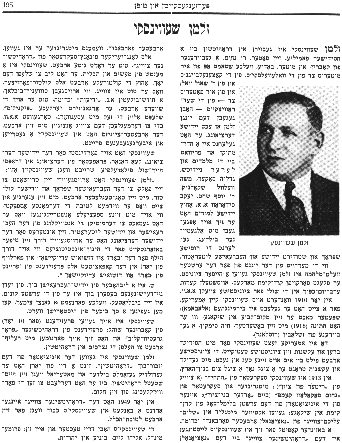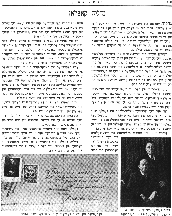Previous Page
|
Next Page

[Page 195]
ZALMAN SHEVINSKY
[photo:] Zalman Shevinsky
Zalman Shevinsky was born into a chassidic family in Drohitchin. His father, R. Nachum, was originally from Kobrin, and his mother, Bodya, on her mother's side was of the Valevelsky and Katzenelbogen families and related to R. Shaul Wahl. On her father's side she was related to the Shedrovitskys. Zalman's parents provided him with a proper Jewish upbringing: he studied in a modernized kheder and privately with religious teachers and teachers Neiditch, Gedaliah Sacker, Moshe Velvel Skolnick, R. Yosef Shachat, Yaakov Sidorov and others. In addition to Jewish subjects, Zalman also studied general subjects such as Russian language and Yiddish and Hebrew literature.
Just like the majority of young people before World War I, Zalman Shevinsky was an enthusiastic Zionist. He sold Jewish National Fund stamps and set out charity plates on the eve of Yom Kippur in synagogues on behalf of Zionist projects. In 1910, Zalman came to the United States, living briefly in Birmingham, Alabama. He then moved to Chicago where he married Chaya Simkin of Zhlobin, Russia in 1916.
In the United States devoted himself to Zionist causes with his usual chassidic enthusiasm, and this work filled his time both day and night. He patiently and stubbornly added one brick after another to building Palestine. In 1913, Shevinsky became secretary of Techiya [Rebirth], a branch of the Knights of Zion; he was a co-founder and secretary of Camp Nachum Sokolov of the Bnai Zion Order; he was one of the founders of the first Flower Days of the National Jewish Fund in Chicago; he was an active member of the Sholem Aleichem Branch of the National Workers' Union, etc.
Of special interest was Shevinsky's involvement in the “Drohitchin Branch” of the National Workers' Union, an organization that he helped establish. As the long-standing finance secretary of the Drohitchin Branch, Shevinsky did a lot of good work, and was a person of action and purpose. He enjoyed carrying a burden. In addition to cultural activities in his role as cultural affairs chairman of the Drohitchin Branch, Zalman was published souvenir booklets, a monthly bulletin, news announcements, etc. He was also heavily involved in organizing yearly picnics, carrying the bags of food himself, handling purchases, etc. in order to help the Branch pursue its work. Labor Zionism found a reliable and devoted friend in Zalman Shevinsky.
Shevinsky also worked on behalf of Jewish education. Leo Honor, professor of Education at Dropsie University, Philadelphia wrote the following about Shevinsky:
“Zalman Shevinsky demonstrated his loyalty to his people, to the Hebrew language, and to Jewish culture with his daily work, energy and time that he devoted to those issues, as well as with his tremendous efforts on behalf of promoting the development of Hebrew and Yiddish literature. He was interested in Jewish education and showed that interest through his deep concern for educational institutions, as well as for the Board of Jewish Education during his years as president of the Friends of the Jewish Board of Education.”
Shevinsky was a devotee of Yiddish and Hebrew books, and was one of the first to purchase any newly published quality book. His library, which filled an entire room, included many books of historical value. Shevinsky was also president of the Kobriner Synagogue for 10 years; president of the Drohitchin Progressive Club, and was involved in relief efforts to assist the needy of Drohitchin. Zalman Shevinsky initiated the idea of the Drohitchin Yizkor Book, and for years patiently collected photos and material about his hometown of Drohitchin until he was able to see the realization of his dream.
In 1949, the Drohitchin Branch held a banquet in honor of Shevinsky for his work on behalf of the community. The Shevinskys have three daughters and one son: Fruma-Mindel, Eliyahu Leib, Bunya and Yehudit.

[Page 196]
GEDALIAH KAPLAN
Gedaliah Kaplan was born in Drohitchin in 1895 to his parents, Aharon David and Bobba. He received his education in the kheder, under R. Eliyahu Machles, Meir Kaplan and Mordechai Minkovitch. He also studied briefly in the Maltsh yeshiva until he became influenced by the Enlightenment movement, when he began reading books and studying on his own.
Kaplan then got involved in community activities, something that became part of his life. He helped poor people in need; he helped establish a library in Drohitichin even before World War I, serving as its librarian for 5 years and spreading Jewish culture among the young people. On the other hand, he also started a children's study group for poor children, teaching them Mishnah on the Sabbath.
When the typhus epidemic broke out in 1915, Kaplan worked as a volunteer medic at the German isolation hospital, where he helped saved the lives of many Drohitchin Jews until he came down with the terrible sickness himself.
Even before World War I, Kaplan was already a Zionist, and sold Jewish National Fund stamps at Jewish celebrations.
When the Balfour Declaration was made public, Kaplan started to increase his work on behalf of Zionism, collecting money for Zionist funds and preaching Zionism. In the beginning of 1919, Kaplan served as a policeman and deputy soltis under the Polish authorities. In that same year, the Poles lost Drohitchin to the Bolsheviks, and Kaplan was forced to flee Drohitchin because of his work for the Polish authorities. Eventually he made his way to the United States and settled in New York.
In the United States, Gedaliah Kaplan found enormous possibilities for his community work. He decided to start the National Workers' Union, and helped build the Zionist movement in New York. In the [last] twenty years, Kaplan [has been] the recording secretary of Branch 401 of the National Workers' Union and an activist on behalf of the Jewish National Fund.
As secretary of the Relief Fund of Drohitchin émigrés in New York for 15 years, Kaplan succeeded in his work on behalf of needy Jews in Drohitchin before World War II, and later on behalf of survivors in the German camps, sending money and food packages. He stayed in constant contact with the survivors of Hitler's hell, and tried to console them.
Gedaliah Kaplan also published 42 poems in Amerikaner, and wrote articles there from time to time since 1934 about events and personalities. In 1952 Kaplan traveled to Israel, where he was greeted with great respect by Drohitchin Jews living there.
Kaplan worked faithfully on the Drohitchin yizkor book, collecting
pictures, information and money that greatly assisted in the publishing of
the book. Gedaliah Kaplan was married to Perl Piasetsky, a daughter of
Shmuel Yudel, the Elder of Drohitchin. They had one son, Aharon.
[photos:] Gedaliah Kaplan (right) and Moshe Aharon Zaretsky, a refugee, in Montreal in 1948.
A photostat of Gedaliah Kaplan's Polish passport, 1918.
Previous Page
|
Next Page
This material is made available by JewishGen, Inc.
and the Yizkor Book Project for the purpose of
fulfilling our
mission of disseminating information about the Holocaust and
destroyed Jewish communities.
This material may not be copied,
sold or bartered without JewishGen, Inc.'s permission. Rights may be
reserved by the copyright holder.
JewishGen, Inc. makes no representations regarding the accuracy of
the translation. The reader may wish to refer to the original material
for verification.
JewishGen is not responsible for inaccuracies or omissions in the original work and cannot rewrite or edit the text to correct inaccuracies and/or omissions.
Our mission is to produce a translation of the original work and we cannot verify the accuracy of statements or alter facts cited.
 Drogichin, Belarus
Drogichin, Belarus
 Yizkor Book Project
Yizkor Book Project
 JewishGen Home Page
JewishGen Home Page
Yizkor Book Director, Lance Ackerfeld
This web page created by Lance Ackerfeld
Copyright © 1999-2026 by JewishGen, Inc.
Updated 13 Dec 2001 by LA

 Drogichin, Belarus
Drogichin, Belarus
 Yizkor Book Project
Yizkor Book Project
 JewishGen Home Page
JewishGen Home Page